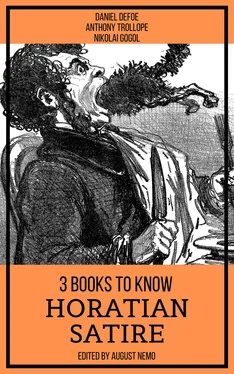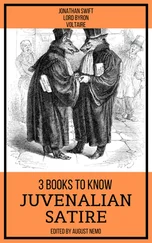A man more antagonistic to the bishop than Father John Barham, the lately appointed Roman Catholic priest at Beccles, it would be impossible to conceive; — and yet they were both eminently good men. Father John was not above five feet nine in height, but so thin, so meagre, so wasted in appearance, that, unless when he stooped, he was taken to be tall. He had thick dark brown hair, which was cut short in accordance with the usage of his Church; but which he so constantly ruffled by the action of his hands, that, though short, it seemed to be wild and uncombed. In his younger days, when long locks straggled over his forehead, he had acquired a habit, while talking energetically, of rubbing them back with his finger, which he had not since dropped. In discussions he would constantly push back his hair, and then sit with his hand fixed on the top of his head. He had a high, broad forehead, enormous blue eyes, a thin, long nose, cheeks very thin and hollow, a handsome large mouth, and a strong square chin. He was utterly without worldly means, except those which came to him from the ministry of his church, and which did not suffice to find him food and raiment; but no man ever lived more indifferent to such matters than Father John Barham. He had been the younger son of an English country gentleman of small fortune, had been sent to Oxford that he might hold a family living, and on the eve of his ordination had declared himself a Roman Catholic. His family had resented this bitterly, but had not quarrelled with him till he had drawn a sister with him. When banished from the house he had still striven to achieve the conversion of other sisters by his letters, and was now absolutely an alien from his father’s heart and care. But of this he never complained. It was a part of the plan of his life that he should suffer for his faith. Had he been able to change his creed without incurring persecution, worldly degradation, and poverty, his own conversion would not have been to him comfortable and satisfactory as it was. He considered that his father, as a Protestant — and in his mind Protestant and heathen were all the same — had been right to quarrel with him. But he loved his father, and was endless in prayer, wearying his saints with supplications, that his father might see the truth and be as he was.
To him it was everything that a man should believe and obey — that he should abandon his own reason to the care of another or of others, and allow himself to be guided in all things by authority. Faith being sufficient and of itself all in all, moral conduct could be nothing to a man, except as a testimony of faith; for to him, whose belief was true enough to produce obedience, moral conduct would certainly be added. The dogmas of his Church were to Father Barham a real religion, and he would teach them in season and out of season, always ready to commit himself to the task of proving their truth, afraid of no enemy, not even fearing the hostility which his perseverance would create. He had but one duty before him — to do his part towards bringing over the world to his faith. It might be that with the toil of his whole life he should convert but one; that he should but half convert one; that he should do no more than disturb the thoughts of one so that future conversion might be possible. But even that would be work done. He would sow the seed if it might be so; but if it were not given to him to do that, he would at any rate plough the ground.
He had come to Beccles lately, and Roger Carbury had found out that he was a gentleman by birth and education. Roger had found out also that he was very poor, and had consequently taken him by the hand. The young priest had not hesitated to accept his neighbour’s hospitality, having on one occasion laughingly protested that he should be delighted to dine at Carbury, as he was much in want of a dinner. He had accepted presents from the garden and the poultry yard, declaring that he was too poor to refuse anything. The apparent frankness of the man about himself had charmed Roger, and the charm had not been seriously disturbed when Father Barham, on one winter evening in the parlour at Carbury, had tried his hand at converting his host. ‘I have the most thorough respect for your religion,’ Roger had said; ‘but it would not suit me.’ The priest had gone on with his logic; if he could not sow the seed he might plough the ground. This had been repeated two or three times, and Roger had begun to feel it to be disagreeable. But the man was in earnest, and such earnestness commanded respect. And Roger was quite sure that though he might be bored, he could not be injured by such teaching. Then it occurred to him one day that he had known the Bishop of Elmham intimately for a dozen years, and had never heard from the bishop’s mouth — except when in the pulpit — a single word of religious teaching; whereas this man, who was a stranger to him, divided from him by the very fact of his creed, was always talking to him about his faith. Roger Carbury was not a man given to much deep thinking, but he felt that the bishop’s manner was the pleasanter of the two.
Lady Carbury at dinner was all smiles and pleasantness. No one looking at her, or listening to her, could think that her heart was sore with many troubles. She sat between the bishop and her cousin, and was skilful enough to talk to each without neglecting the other. She had known the bishop before, and had on one occasion spoken to him of her soul. The first tone of the good man’s reply had convinced her of her error, and she never repeated it. To Mr Alf she commonly talked of her mind; to Mr Broune, of her heart; to Mr Booker of her body — and its wants. She was quite ready to talk of her soul on a proper occasion, but she was much too wise to thrust the subject even on a bishop. Now she was full of the charms of Carbury and its neighbourhood. ‘Yes, indeed,’ said the bishop, ‘I think Suffolk is a very nice county; and as we are only a mile or two from Norfolk, I’ll say as much for Norfolk too. “It’s an ill bird that fouls its own, nest.”’.
‘I like a county in which there is something left of county feeling,’ said Lady Carbury. ‘Staffordshire and Warwickshire, Cheshire and Lancashire have become great towns, and have lost all local distinctions.’
‘We still keep our name and reputation,’ said the bishop; ‘silly Suffolk!’
‘But that was never deserved.’
‘As much, perhaps, as other general epithets. I think we are a sleepy people. We’ve got no coal, you see, and no iron. We have no beautiful scenery, like the lake country — no rivers great for fishing, like Scotland — no hunting grounds, like the shires.’
‘Partridges!’ pleaded Lady Carbury, with pretty energy.
‘Yes; we have partridges, fine churches, and the herring fishery. We shall do very well if too much is not expected of us. We can’t increase and multiply as they do in the great cities.’
‘I like this part of England so much the best for that very reason. What is the use of a crowded population?’
‘The earth has to be peopled, Lady Carbury.’
‘Oh, yes,’ said her ladyship, with some little reverence added to her voice, feeling that the bishop was probably adverting to a divine arrangement. ‘The world must be peopled; but for myself I like the country better than the town.’
‘So do I,’ said Roger; ‘and I like Suffolk. The people are hearty, and radicalism is not quite so rampant as it is elsewhere. The poor people touch their hats, and the rich people think of the poor. There is something left among us of old English habits.’
‘That is so nice,’ said Lady Carbury.
‘Something left of old English ignorance,’ said the bishop. ‘All the same I dare say we’re improving, like the rest of the world. What beautiful flowers you have here, Mr Carbury! At any rate, we can grow flowers in Suffolk.’
Читать дальше












